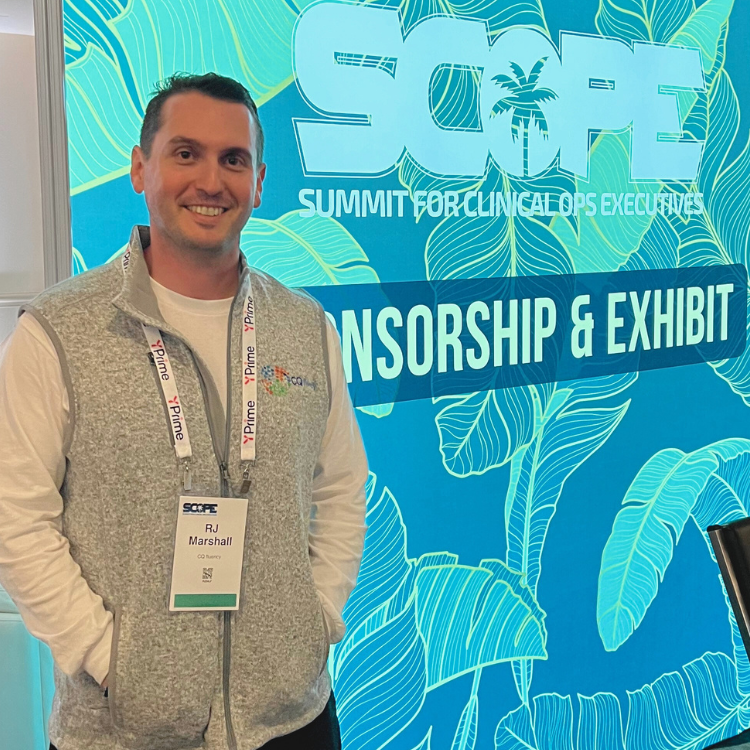SCOPE Orlando 2024, a gathering of minds dedicated to advancing clinical research, proved to be a melting pot of ideas, insights, and challenges. CQ fluency’s VP of Strategic Accounts, RJ Marshall, delved into the pressing challenges and issues facing clinical trials at this year’s summit. Among the myriad topics discussed, one recurrent theme echoed: the challenge of getting participants into clinical trials, keeping them engaged once in the trial, and making sure they stay in the trial once onboarded.
With millions of dollars being invested in R&D, it is imperative that Sponsors and those supporting them are consistently filling and maintaining a pipeline of study participants to ensure the efficacy of the drugs being tested. Of particular importance was how the Sponsor support eco-system (CROs, Sites, IRBs) was addressing cultural nuances when it came to engaging with non-English speakers. As the FDA emphasizes, “Participants in clinical trials should represent the patients that will use the medical products.” Unfortunately, this is often not the case. People from racial and ethnic minority groups are underrepresented in clinical research. This lack of diversity poses significant challenges to the validity and generalizability of trial findings.
driving diversity for clinical trials
While the lack of diversity in clinical trials is a systemic problem, it is crucial to recognize that diversity encompasses more than just race and ethnicity. Factors such as age, gender, socio-economic status, and language proficiency also play significant roles in shaping individuals’ health outcomes and responses to medical treatments. Ensuring diversity across these dimensions is essential for advancing health equity and improving the quality of healthcare for all individuals.
To address the lack of diversity in clinical trials, it is imperative to implement strategies that promote inclusivity and accessibility. Translation services play a vital role in this regard, ensuring that trial materials are available in multiple languages and culturally appropriate. By providing translated materials and offering language support throughout the trial process, sponsors can improve communication, enhance patient comprehension, and foster trust among diverse populations.


RJ shared these top 5 insights from SCOPE 2024 to consider for a successful and diverse clinical trial:
- language inclusivity: Ensure that trial information transcends language barriers, embracing cultural authenticity and resonance. Effective translation involves more than mere words; it incorporates cultural nuances, fostering trust and understanding across diverse participant backgrounds. Recognize the varying levels of trust individuals may have with the medical community, emphasizing the importance of building genuine connections.
- empowering decision-making: Equip participants with clear and comprehensive trial details, enabling them to navigate decisions with confidence. Consider participants’ technological preferences, ensuring accessibility through adaptable mediums such as pen and paper.
- ethical transparency: Uphold ethical standards by accurately translating consent forms and trial documents, ensuring participants fully comprehend the implications of their involvement and fostering voluntary participation.
- simplified communication: Tailor medical information to match the average reading level and medical literacy of participants, facilitating better understanding and adherence to trial protocols and treatment regimens.
- enhanced patient experience: Cultivate a supportive environment that minimizes misunderstandings and promotes inclusivity, thereby enhancing patient retention and bolstering the trial’s overall success. Recognize that providing language support and translated materials contributes significantly to a positive patient experience, reducing dropout rates and optimizing trial outcomes.

bridging barriers
In conclusion, addressing the lack of diversity in clinical trials is essential for advancing medical research and promoting health equity. Translation services, provided by experienced language service providers like CQ fluency, play a crucial role in making clinical trials more inclusive and accessible to diverse populations. By ensuring that language and cultural barriers are effectively addressed, sponsors can conduct trials that are more representative and impactful, ultimately leading to better healthcare outcomes for all individuals. Thank you, SCOPE 2024, for shedding light on this critical issue. We have learned a lot, and we are committed to driving positive change in the field of clinical research.
